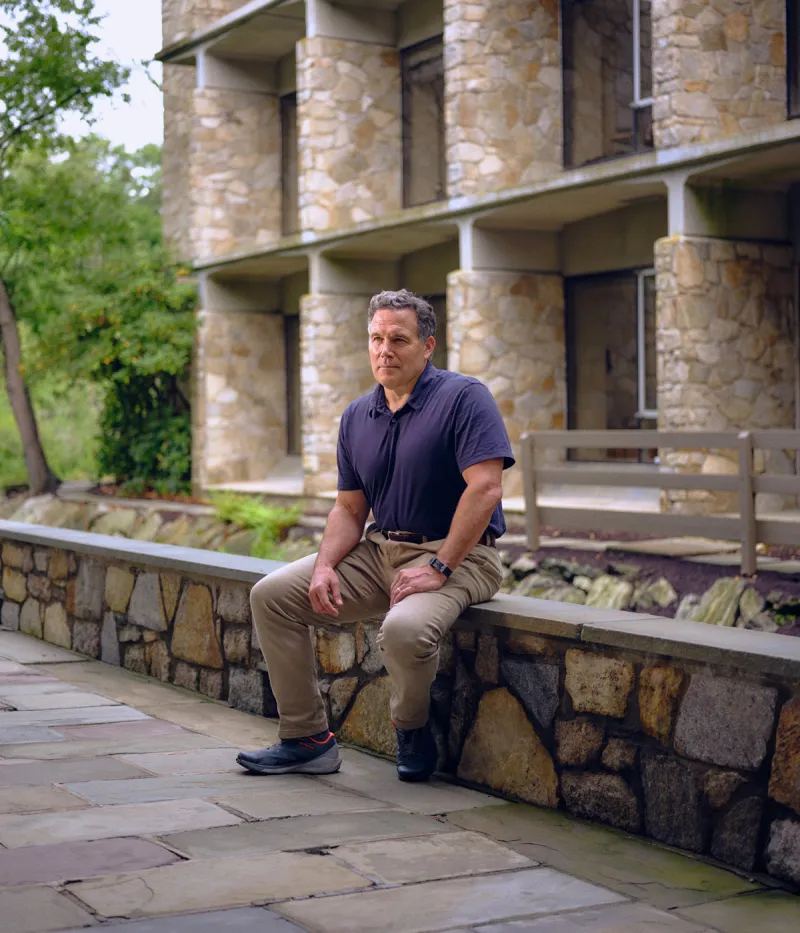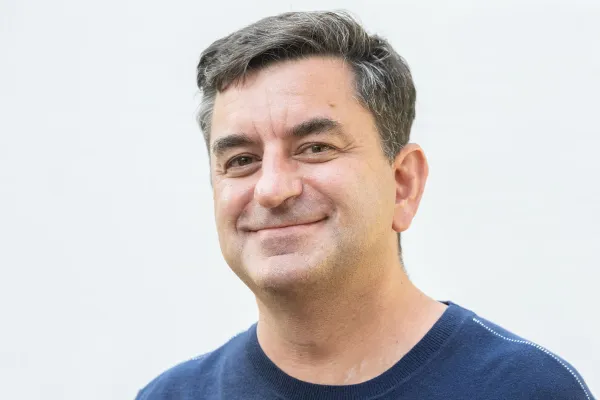
David McCormick
(Photographs by Christopher Leaman)
The email, formal and foreboding, landed at 9:38 a.m. on Monday, March 2.
“Can you please call me when you have a second to talk?” the Bridgewater Associates employee asked.
The call, the email’s recipient knew, would not be good: Karen Karniol-Tambour, the hedge fund’s head of investment research, was scheduled to be a lunchtime speaker at an investment conference at Washington, D.C.’s Watergate Hotel just over 24 hours later. But at that moment, on March 2, a man in Westchester County — a mere 30 miles from Bridgewater’s two main campuses in Westport, Connecticut — was undergoing treatment as the first Eastern Seaboard case of Covid-19 with an unknown origin. Karniol-Tambour wasn’t going to make it, the conference organizer feared.
Bridgewater had been on high alert all weekend. The firm’s health security “posture” was the subject of ongoing discussions. Already, anyone who had traveled to certain areas — including the West Coast of the U.S., where Covid-19 had already killed individuals in Washington state — or lived with someone who had traveled, was barred from the offices.
That morning, Bridgewater’s posture changed. On the advice of chief administrative officer Richard Falkenrath — a former member of George W. Bush’s administration and a former leader in New York City’s counterterrorism unit — senior executives would immediately cease travel, including to conferences. Amazon accounts let Bridgewater employees order anything they needed to furnish home offices. Company helplines went live. Bridgewater secured private Covid-19 testing capabilities for a small number of employees it planned to keep onsite. Bimonthly companywide virtual meetings hit employees’ calendars. Research chief Karniol-Tambour would still attend the conference — but only via Zoom.
Nearly ten days before companies up and down the Eastern Seaboard abandoned urban offices, restaurants, schools, and the trappings of normal life, Bridgewater — a hedge fund renowned for macro analysis — emptied its campuses and sent employees home to Connecticut, New York, Colorado, and elsewhere.
The company’s operations were prepared; its portfolios weren’t.
The problem in March, though, was that it wasn’t doing that.
The firm’s largest and flagship fund — Pure Alpha II — had lost 23 percent in the first three months of the year due to a “long tilt,” or bias toward rising markets, as Covid-19 hit, according to founder and co-CIO Ray Dalio. At the end of July, the fund had lost 20 percent of investors’ money, despite stock markets’ astounding rebound from their March lows. These losses were following an abysmal 2019, when the firm’s flagship fund lost 0.5 percent as the S&P 500 index returned 29 percent. (Though 2018 was much better, with Pure Alpha II up 15 percent as the stock market sank.)
If a hedge fund’s primary job is making money, its secondary one is arguably to avoid negative news: Clients don’t want to read about their scandals in The Wall Street Journal or, say, Institutional Investor.
But that has happened twice since Bridgewater went remote. A July 1 legal filing revealed that Bridgewater had gone after two former employees — Lawrence Minicone and Zachary Squire of Tekmerion Capital Management — and effectively lost. Bridgewater had accused them of “misappropriation of trade secrets, breaches of contract, and unfair competition”; the arbitration panel disagreed, and instructed Bridgewater to pay the young duo’s legal fees.
Then came the body blow. In late July, Eileen Murray — a longstanding co-CEO who’d left in April and formerly the firm’s most senior woman— sued. She alleged that Bridgewater was withholding owed compensation after she disclosed ongoing gender discrimination, unequal pay, and a breach-of-contract dispute to the Financial Industry Regulatory Authority (FINRA), Wall Street’s self-policing agency, which she now chairs. In her lawsuit, Murray accused Bridgewater of “brazen hypocrisy” and lambasted her former employer for “publicly avowing transparency when it suits its interest but seeking to harshly punish those who publicly report facts, which Bridgewater perceives to be damaging to its image.”
Enter David McCormick, unintentional crisis junkie.
After ten years at Bridgewater, McCormick became its sole CEO in April following Murray’s departure, just as a trifecta of pandemic, poor performance, and bad publicity rattled the famed hedge fund. For McCormick, the timing was typical. After graduating from West Point in 1987, he joined the Army’s 82nd Airborne Division as the U.S. inched toward the first Gulf War. After a stint at management consultant McKinsey & Co., he joined software company FreeMarkets in 1999 — before the dot-com bubble burst. He moved to Washington to join the George W. Bush administration, entering the Treasury Department’s inner circle mere months ahead of the global financial crisis.
This time, as the pandemic hit, McCormick moved to Colorado to hunker down with new wife Dina Powell — herself an even greater D.C. and Wall Street powerhouse — and their six daughters. But by early August, McCormick was back in Connecticut, intent on pushing ahead a new strategy for the firm. Over multiple interviews with II, McCormick laid out that blueprint for returning Bridgewater to what many employees and clients consider its rightful place atop the world of finance.

“The clients certainly would’ve hoped we’d had better performance,” he admits. Pure Alpha II, for example, which aims to return 18 percent regardless of broader markets, has delivered negative 2 percent over the last five years as of July, net of fees. Firmwide assets have fallen from a peak of more than $160 billion to $140 billion, which McCormick says is “primarily a consequence of our performance.” Yet he says the money is flowing back in. “One of the things that we were able to offer our clients in March and April was liquidity. Some clients pared back their positions for liquidity; some smaller clients have eliminated their hedge fund buckets altogether in this period, and that’s affected us. But there have been pretty significant inflows.” Since March, he estimates clients have added $8 billion and “something like 45 commitments of additional inflows between now and the end of the year.”
Some outsiders are skeptical. “You probably aren’t going to see an exodus from Bridgewater, but maybe the things that people read now will lead to redemptions six to 18 months from now,” says one consultant, who has at least one client invested with Bridgewater. Powerful advisory outfits funnel direct pension funds and other institutions to invest capital in blue-chip firms like Bridgewater, which means any decision to pull investments happens slowly, the source says. “I suspect that people may be putting them on watch.”
Regarding the Tekmerion and Murray legal wrangling, “We have a process that we agree to for disputes and disagreements,” McCormick says, adding that in his 11 years at the firm, it has gone through closed-door mediation and arbitration “a handful of times” with former employees. “The reason for the confidentiality provision is because we want to actually be able to go through that process with an objective judge and arbitrator — and not have it mediated through the media.” (Two other disputes did end up in the public eye. In 2016, The New York Times reported that a now-former employee had filed a complaint with the Connecticut Commission on Human Rights and Opportunities after his male boss allegedly sexually harassed him, and in 2010 Bridgewater sued a former employee who tried to take a job at rival manager PIMCO.)
Representatives of Tekmerion and Murray declined to comment for this story.
McCormick wouldn’t specifically address Murray’s claims of “brazen hypocrisy,” but says he “doesn’t think it’s inconsistent at all” to ask for radical transparency within the firm and secrecy outside of it. “Ray has always said this: Radical transparency is not total transparency. There are certain things that we’re not transparent about, and consciously so.” Personnel and salary discussions, for example. Still, one industry insider expresses confusion as to why Bridgewater is “yanking Eileen through all of this mess,” calling the case “petty.” The insider adds, “A lot of lawsuits are won not on the merits of the case, but who has deeper pockets.” And Bridgewater’s pockets are deep.
The conflict with Murray seems to legitimately upset McCormick.
“I’m sad about it. I’m sorry that we’re in a disagreement with her, and I wish we weren’t,” he says. The two joined Bridgewater at the same time 11 years ago, and spent three years together as chief executives before Murray left. “During our co-CEO time, we probably talked every day 99 percent of the time. She was a constant force in my life.” Bridgewater watchers share two competing theories sotto voce: either Murray and McCormick were close partners before her departure, or the two ruled over distinct fiefdoms, with McCormick victorious in an internal political intrigue. Of these theories, McCormick simply says, “Not the second.” There is sadness in his voice.
For every turmoil, there is a principle. Whether you’ve read John Cassidy’s masterful New Yorker profile of Bridgewater, devoured an early bootlegged PDF of the firm’s management doctrine, or been subjected to promoted tweets and LinkedIn posts featuring the firm’s management-speak, you know that almost any scenario can slot into at least one of Dalio’s mantras. And for the five months of McCormick’s sole-CEO reign, the most obvious guiding principle is also one of the most well known: “Pain plus reflection equals progress.”
“If you look at the history of Bridgewater since 1991, we’ve had five drawdowns — including our drawdown of March — of equal magnitude,” McCormick says, referencing the firm’s dreadful pandemic performance. “And if you look at the period that followed each of them, you’ll see a pretty significant compounding of return over that period.” The dark periods also spur “reflection, innovation, a series of things that came as a consequence of reassessment. That’s the process we’re in now.”
Because McCormick is not himself an investor — co-CIOs Dalio, Bob Prince, and Greg Jensen lead those efforts — his “reassessment” largely focuses on the client base. (He also notes “new research, new markets traded, and the whole innovation loop that is happening in our research and investment organization.”) And it’s changes related to that client base — whom the firm manages money for, and how they engage with Bridgewater — that McCormick will be judged on.
“There is a shift coming,” he says. “Part one of that shift is to narrow the scope of the clients that we’re going deeper with in these custom advisory relationships. Even if our assets grow substantially, the number of clients will likely decrease.” Bridgewater currently works with approximately 300 clients, he says, many of whom get consulting services gratis — if paying investment-management fees that have made multiple employees billionaires can be considered gratis. “In the early days, Ray was the client adviser for some of our biggest clients — and now we’re doubling down on that kind of relationship with a narrower set of clients.” It’s unclear how this winnowing will happen, whether by actively cutting ties or simply not replacing clients who leave.
But in whittling down the existing client base, Bridgewater is also looking to expand its client breadth. “Part two of the strategy is developing a much more robust distribution network that will allow us to access investors that we would typically not serve,” says McCormick, referring to other firms that aggregate clients on a massive scale — platforms, in industry jargon. This, perhaps, is the most significant departure from Bridgewater’s past, where it preferred to control direct relationships with the individuals overseeing the institutional assets that make up its client base. “It’s a choice,” McCormick says. “We could have decided to build it; we could have decided to buy it.” Bridgewater settled on something between the two: choosing to partner with a few “discrete” firms to deliver products in Latin America and Asia. “We were always a little bit tentative because it was somebody else telling our story — but I think what we’ve convinced ourselves is that with the right partners, and the right investment of time and energy on both sides, and the technology, frankly, our ability to generate longstanding partnerships is higher,” he says.
The third leg of McCormick’s strategy has been years in the making: a “fundamentally different way of engaging with clients through technology.” Outsiders estimate the firm has spent around $100 million on client-facing technology in recent years, but Bridgewater would not confirm the amount. McCormick, though, is happy to discuss the central goal of the technology push — a push, rivals say, intended to make the firm essential even when performance doesn’t.
BlackRock has Aladdin — its all-encompassing risk-measurement system — and Two Sigma has Venn. Bridgewater has its “risk budgeting tool,” known internally as the “RBT.” Intended as a “uniquely sophisticated way of helping clients do portfolio planning and understand risk,” according to McCormick, the technology platform basically lets clients analyze the entirety of their portfolios — not just the hundreds of millions, or billions, they have with Bridgewater.
“In seconds, we can apply hundreds of thousands of slices of data, hundreds of unique stress-test scenarios, and dozens of specific reports on parts of our client’s portfolio,” according to an internal document, which also claims that 90 percent of the firm’s largest clients use the tool. The RBT is also touted as “the basis of our dynamic publishing capability, the Bridgewater ‘Daily Observations’” — the daily written analysis that many professional investors consider unequaled. According to the document, the firm’s 2020 publishing schedule has been blistering: 100 pieces of “new media,” including 30 to 40 videos and podcasts, strategic and quarterly reports, interactive “Daily Observations,” and microsites focused on topics like Covid-19.
“Invest in technology while focusing religiously on clients” isn’t exactly cause for a new Harvard Business School case study. What might actually merit that level of attention, however, is the larger question looming over McCormick: How do you manage the world’s largest hedge fund firm when the man who founded it, and remains one of the most famous personalities in finance, still comes to the office every day?

Straightforward, humble, earnest, common sense, devoted to the mission. This is how Dalio described McCormick in a late-August interview. “I think most people would say I’m probably more confrontational. Dave — everybody would think Dave’s a good guy. Maybe I don’t come across as a good guy all the time. So I think that’s a big difference in our styles.”
Those differences in style are partially why, with the help of a headhunter, Bridgewater brought McCormick on board in 2009. “There are different styles and common values,” Dalio explains. Common values are essential for any functional relationship, Dalio believes, but different styles — in work as in life — can complement each other. McCormick’s onboarding, however, was difficult. “It’s rocky for everybody!” Dalio explains. “People either love it or hate it” at Bridgewater, “and it takes getting used to.”
While hedge fund succession is rarely executed well, the rationale for McCormick’s role seems clear. “I think a lot of CIOs learn that you come in, you’re an investor, and you build a business,” Dalio says. “And when you build a business, you’ve got to be CEO too — and that stretches you. It’s way too much to be both; it’s an impossibility.” For comparison, he points to Netflix’s leadership. “Reed Hastings and Ted Sarandos: they’re very different types of people,” Dalio says. “Reed explains it well: ‘Ted is the artist; he can pick things and he’s got the touch.’ Reed is the businessman. They’re both half of the whole.”
As such, “My day-to-day is thinking about the world and investing and so on,” Dalio says. “David’s day-to-day is thinking about running the business. And I’m still chairman — so in that capacity, we talk about what are his biggest issues, worries, and so on. We have our clear decision rights, and I basically offer thoughts if asked.”
But is the man who has been referred to as the Steve Jobs of investing really just like any other employee? Yes and no. “So, it’s obviously of their choosing if I’m still there,” Dalio says. “Not just Dave, but about Bob’s and Greg’s choosing. And of course, it’s a mutual choosing: I love to play my game. But if they don’t want me to be there, I sure as hell wouldn’t.” Still, he remains the undisputed power center of the firm.
Where does that leave McCormick? When pressed, he admits to admiring a CEO peer: Satya Nadella of Microsoft. “I’ve thought a lot about this,” he says. Microsoft also has a larger-than-life founder who remains important to the company, and yet pulled off a “wildly successful” leadership transition in McCormick’s view.
“You look at the role that Bill Gates played, the phenomenal visionary,” he continues. “Now, obviously, Satya wasn’t the CEO immediately following Bill Gates. There was the [Steve] Ballmer era, obviously. But you look at the way that’s landed — Satya has been uniquely successful, really a model CEO. He’s completely different than Bill Gates. He’s not the same DNA in any way. He values Bill Gates’s advice; he’s constantly seeking it. Bill Gates is still very closely aligned with Microsoft, but Bill Gates has a brand that’s huge and looms large.” The comparisons to Dalio are obvious.
“David came across as someone that, broadly, had a bit of humanity from him,” says one former employee, who asked to speak anonymously. “He came from outside, had run a large company, and had senior leadership experience from the military. He knew intuitively about building morale and rapport.” The source adds that McCormick’s background set him apart from some of the firm’s other executives, who spent much of their career at Bridgewater living and managing by Dalio’s principles.
“It was an introduction to a whole different part of the country, the diversity of the African American kid from Newark and the country boy from Alabama and the college dropout from Boston, and you forge them into a unit,” he says.
When the war broke out, McCormick, a first lieutenant, was training with his unit in Arkansas. His team got a call to load up its equipment and head to Fort Bragg in North Carolina. The group cleaned its equipment, collected ammunition, and flew to Saudi Arabia, which was under threat of invasion by Iraqi forces. McCormick’s unit was the first to deploy there, just days after Saddam Hussein’s military invaded neighboring Kuwait.
“Remember, at that time, there were no cellphones, no email,” McCormick says. “This was 1990. I called my folks from the base before we left and said, ‘I’m headed out. I’m not sure when we’ll be back.’” McCormick was gone for nine months, communicating with family almost exclusively through letters.
McCormick adds: “I felt this enormous sense of responsibility.” He remembers telling his unit to write their families so that if something bad happened, their parents would have their letters to hold onto. The military expected a high number of casualties and, worryingly, the use of weapons of mass destruction.
One night, Scud missiles — Hussein’s feared tactical ballistic weapons — were shot over top of McCormick’s unit. Chemical alarms went off. McCormick’s team quickly pulled on protective gear.
“It was a surreal experience, one that I think defined me,” he says, adding that he felt fortunate that most people went unharmed. “I look back on that defining time for me,” he says. “I felt really proud to be part of the military, and fortunate. I felt that it was an opportunity to serve.”
The opportunity to serve came again during the Bush administration — and was offered once again in 2016. According to Reuters, McCormick was offered but declined the role of deputy secretary of defense in the Trump administration. That’s not to say it’s a permanent refusal.
“I don’t have any ambition to do that — but it’s not something that I’ve totally ruled out,” he says. “If you’re asked to serve somewhere, you certainly consider it, really think hard about it. And I want my kids to see that. One of the things I worry about is when you have your kids grow up in Fairfield County, Connecticut, how do you have that ethos of service into country? That’s something that’s very much on my mind.”
What about being Treasury or defense secretary? Both could be possibilities in a Republican administration, given McCormick’s background.
He pauses. “I’m going to give you an honest answer on this,” he eventually says. “I have unfinished business at Bridgewater. And I don’t think, as a practical matter, that it helps to plan for those things — because those things don’t come to those who plan. Those things come out of the air because a certain set of circumstances come together. It would be absolutely the case that if any president calls you and asks you to think about how to serve the country, in a role where you think you can make a difference, you have to consider that. And it would be an incredible honor to be asked.”
But today, McCormick remains in Westport, more hedge fund powerbroker than Washington politician.
For now.





